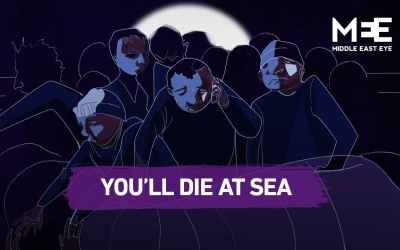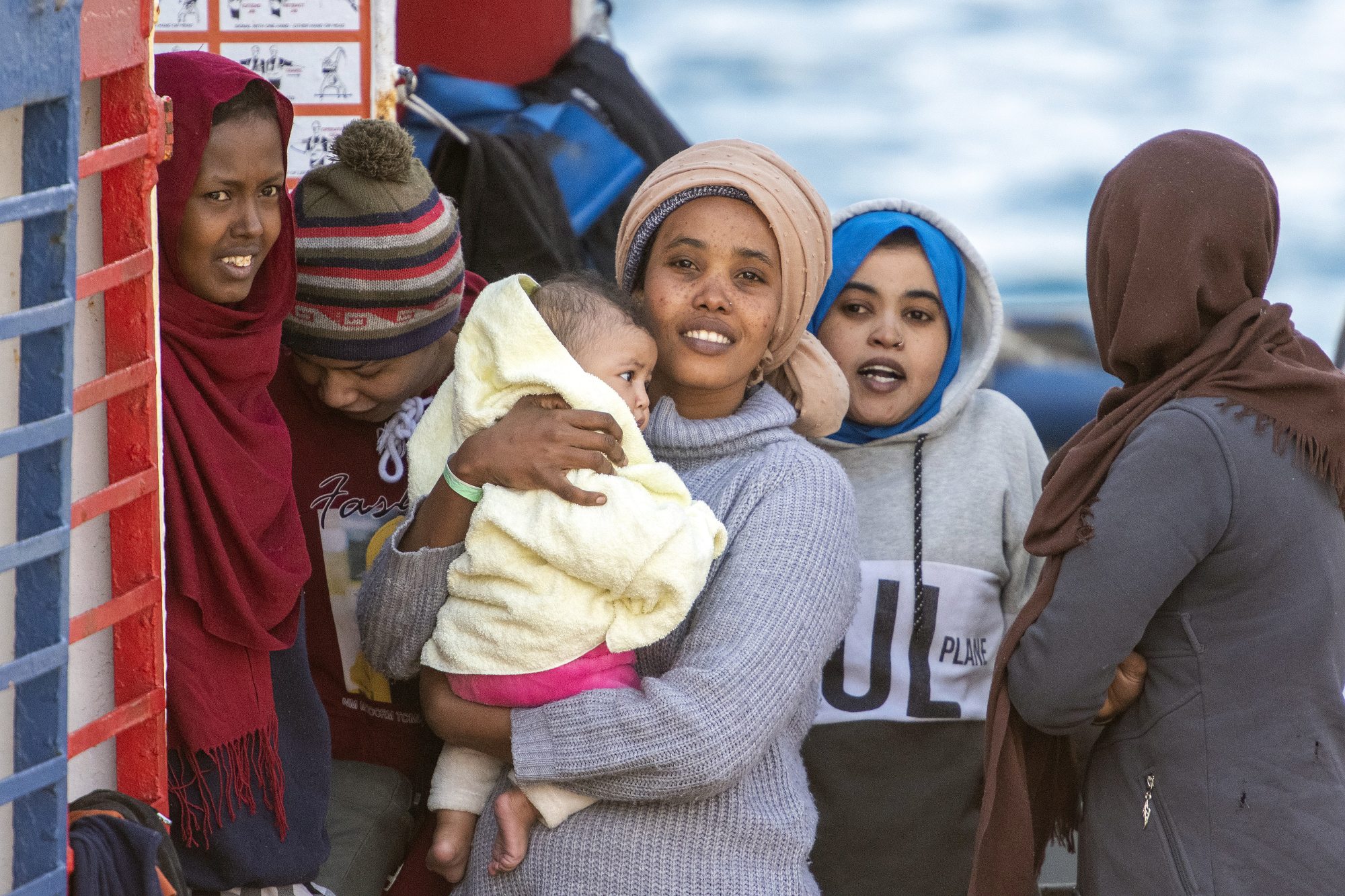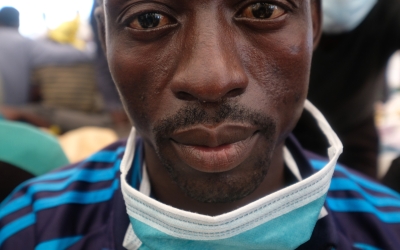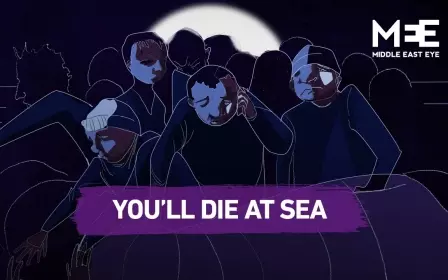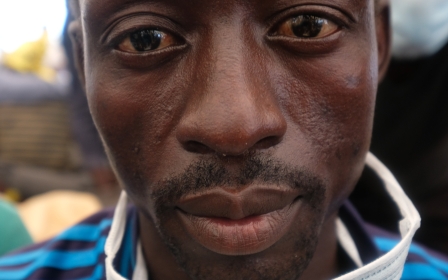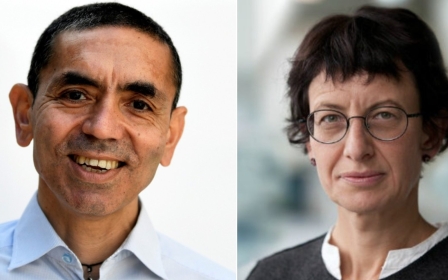How the Covid-19 pandemic impacted migration through the Mediterranean
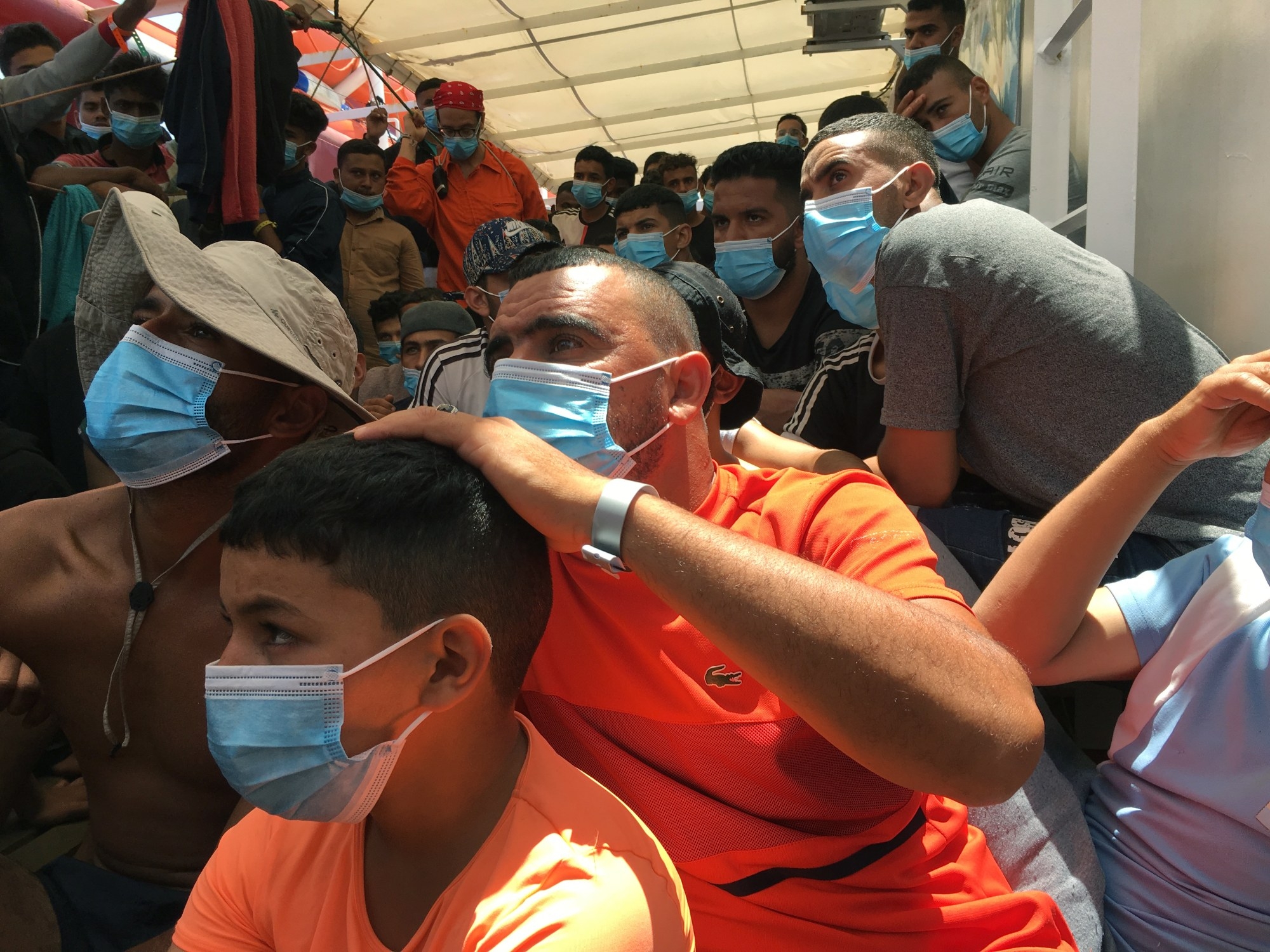
On 1 January, Frontex, the European Union’s border force, tweeted a video celebrating their work in 2020 - a photo montage of masked border guards in bullet proof vests, with a caption boasting “the lowest number of illegal border crossings since 2013”.
Only a few months prior, on 15 August at 4.48pm, Alarm Phone - a hotline set up to support search and rescue missions in the Central Mediterranean - received a distress call from 82 people aboard a deflating dinghy. Over the next six hours, Alarm Phone’s repeated calls to the Maltese, Italian and Tunisian coastguards went unanswered. At 10.25pm, when the boat made its final distress call, Alarm Phone reported that the person on the phone was screaming that they were about to die.
Then the line went dead.
It was only days later that the hotline managed to piece together what had happened via phone calls with survivors. Their dinghy was approached by five armed men, who demanded they hand over their phones and money. Then they opened fire.
“People drowned, there was fire everywhere,” the survivors told the charity. Ten of them had sustained burn injuries, some had even lost their sight. “I can’t believe it. I can’t believe what happened to us. Nobody came. Any ship could have saved us, but no one came.”
New MEE newsletter: Jerusalem Dispatch
Sign up to get the latest insights and analysis on Israel-Palestine, alongside Turkey Unpacked and other MEE newsletters
Among the disappeared was Sudanese poet Abdel Wahab Yousif, also known as Latinos. Unlike other anonymous victims of "invisible shipwrecks", details of Latinos’s life emerged from the black hole of the Mediterranean through his poetry.
Published in social media posts, his writing eerily predicted his own death:
You’ll die at sea.
Your head rocked by the roaring waves,
Your body swaying in the water,
Like a perforated boat.
John Kelechi, a refugee from Nigeria, spoke to Middle East Eye via a patchy Zoom call from the corner of his shared room in Leipzig, Germany. He had attempted the same crossing a year before Latinos.
He had tried it many times - paying his way out of Tripoli's shadowy network of detention centres, and onto flimsy dinghies, only to be intercepted by Libyan militia groups to start the cycle again. This time, however, it wasn’t the militia that stopped him.
Kelechi’s dinghy gave up as it approached an oil rig. He and the 30 other migrants on board were stuck, they waved and shouted at the oil rig crew for help.
“I know they are seeing us. We are five days there, on a rubber boat, without help,” he recalled.
After a day passed, a Swiss-flagged oil tanker, emblazoned with the words "Rescue Zone", approached. The tanker halted in front of them, lights beaming. The passengers shouted for help, their dinghy battered by waves, but no response.
This standoff continued throughout the night.
“I was wondering...this is a rescue zone but why aren’t they rescuing us, what is the problem?” Kelechi recalled, his incredulity echoing the words of the survivors of the August shipwreck.
At the time, Kelechi did not understand that what he was witnessing was part of a pattern of systematic non-assistance and outsourcing of border policing by EU actors. An elaborate smoke and mirrors act to keep migrants from their shores and their hands clean. Latinos, who had attempted the same journey during the pandemic, did not have the time to reach this conclusion.
Both men’s stories are not isolated incidents but part of this pattern, one that has spiralled during the global coronavirus pandemic. Their stories belie the truth behind the fall in migration figures Frontex boasts of.
A deadly gap
The EU border force's claim appears to be supported by the IOM Missing Migrants report, which documented a drop from 1,262 deaths of those making these crossing in 2019, to 977 in 2020.
These figures do not tell the whole story.
“We never received so many accounts of shipwrecks as over the past few months,” read an Alarm Phone blog testifying to the rise in "invisible shipwrecks" during the last six months of 2020.
According to its recently published analysis, the charity supported 10,074 people in distress in 2020. “Of those... 219 people unfortunately drowned or went missing. We also collected several testimonies about many more confirmed shipwrecks of boats that did not alert us when in distress,” the report read. “Lastly, the fate of about 578 people who called us, is unknown to us.”
November was the deadliest month. With all but one search and rescue mission blocked, the only testimony was the 84 bodies washed ashore. According to the UN, a further 77 people remain missing from a series of shipwrecks. Citing the good weather and the economic pressures of a global pandemic as contributing factors, it omitted to mention that the Open Arms was the only search and rescue asset responding to distress alerts.
The leveraging of public health concerns to block search and rescue boats and the grounding of civil surveillance aircrafts had created a "rescue gap"- a black hole in the central Mediterranean where lives simply disappeared.
This is nothing new.
Back in 2017, Italy signed a memorandum of understanding with Libya, an agreement to stem the flow of “illegal immigration” across the central Mediterranean.
Prior to the Hirsi ruling in 2012, which found Italy guilty of refoulement - the forcible return of refugees or asylum seekers to a country where they are liable to be subjected to persecution - Italian vessels would intercept migrants attempting the crossing and ship them back to Libya. Although Italy deemed Libya a safe port of disembarkation, the European Court of Human Rights did not.
Rome had to rethink its strategy. After 2017, Italian authorities began training and equipping a proxy force - the Libyan Coast Guard, composed of former militia groups and smugglers - to police their borders.
The following year, migrant arrivals in Italy plummeted by 80 percent.
According to an Amnesty International report, “Between Life and Death, an estimated 60,000 men, women and children have been captured at sea and disembarked in Libya since 2016, often to return to arbitrary detention where they are subjected to torture, or even disappeared completely.
Italy isn’t acting alone. Behind it, the EU is pulling the strings. Brussels funneled 91.3 million euros ($109.7million) through the Trust Fund for Africa into bolstering the Libyan Coast Guard.
Alarm Phone reported a 12 percent rise in interceptions in 2020. They estimated that 27,435 people tried to leave Libya in 2020, 11,891 of whom were intercepted by the so-called Libyan Coast Guards and pushed back to Libya, according to the IOM.
IOM sources also recorded an uptick in disappearances of refugees after interception and disembarkation - reporting that “more than half of over 6,200 people returned to Libya this year... remain unaccounted for.”
The International Rescue Committee (IRC) reported an "alarming" rise in detention centre figures. “In one detention centre in Tripoli, the number of detainees increased from 23 to over 1,000 in the last two weeks of September - despite currently having the capacity to host and feed only 150 people per day.”
A black box
“This is apparently the new normal,” Hannah Wallace Bowman, the field communications manager for the NGO Doctors Without Borders (MSF) said wearily, via video call from her cabin back in September 2020. She had been aboard the blocked Sea Watch 4 off the coast of Palermo, in Sicily, for over 50 days. It was the fifth ship to be impounded in five months.
As a search and rescue worker operating in the Central Mediterranean, Wallace Bowman's work is continually obstructed by the leveraging of maritime law as a political tool by EU actors. NGOs have been subjected to intimidation, port closures, accusations of collusion with people smugglers and even arrest.
With a global pandemic, these efforts have escalated. As Covid-19 cases spiralled, Italy declared its ports "unsafe" in April for foreign flagged boats to dock.
“You can absolutely honour obligations to assist people at sea... and protect people on land at the same time. But actually they just wrapped up existing and failed anti-migration policies and presented it back as if it’s something in the interests of public health,” Wallace Bowman told MEE.
Just the night before, she and her colleagues had received information via Alarm Phone about a fatal shipwreck off the coast of Libya. A fisherman had rescued as many people as he could, and left the remaining clinging to a deflating rubber boat.
Wallace Bowman’s frustration was palpable: “We’re getting this information oftentimes second-hand because there are no independent witnesses there.”
Invisible shipwrecks
When Kelechi was in the Libyan coastal town of Zuwara, he scraped a living retrieving corpses of migrants who had washed up on the shore.
“We had to take out the dead bodies and bury them, so at the end of the day we would have 5 or 10 dinars ($1.12 to $2.25) to go and eat. You had to look at your fellow brothers dying in the sea, trying to go out to Europe,” he said.
Latinos was one of them. But while he was sucked into the “gap” created by EU policy, his poetry wasn't. It is written indelibly on his social media page - a challenge to the EU’s efforts to avert their eyes from the bodies washing up on it shores:
We will escape from the homeland,
We will run vigorously towards exile,
But alienation is also cruel and unbearable.
It will eventually suck the nectar of our life.
Middle East Eye delivers independent and unrivalled coverage and analysis of the Middle East, North Africa and beyond. To learn more about republishing this content and the associated fees, please fill out this form. More about MEE can be found here.


